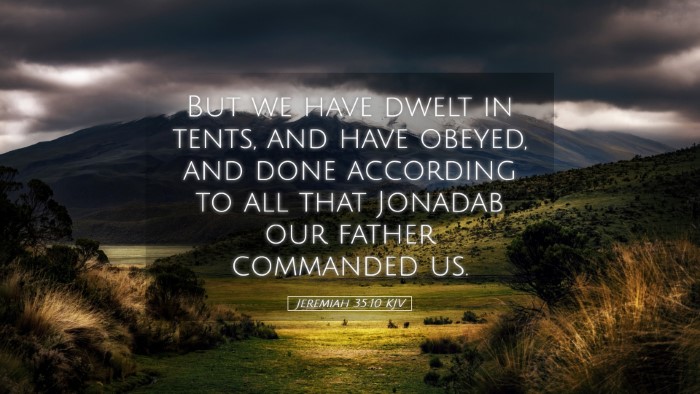Commentary on Jeremiah 35:10
Jeremiah 35:10 declares: "But we have dwelt in tents, and have obeyed and done according to all that Jonadab our father commanded us." This statement by the Rechabites highlights their unwavering obedience and demonstrates a contrast between their lifestyle and that of the surrounding nations. In understanding this verse, we draw insights from esteemed public domain commentaries by Matthew Henry, Albert Barnes, and Adam Clarke.
The Context of Jeremiah 35
The chapter presents an encounter between the prophet Jeremiah and the Rechabites, a nomadic tribe known for their strict adherence to their ancestral rules. This narrative serves as a lesson in obedience and faithfulness. The Rechabites are presented as a model of fidelity in contrast to the unfaithfulness of Israel.
The Call to the Rechabites
Matthew Henry emphasizes that God uses the Rechabites as a living parable. Their lifestyle serves to chastise the people of Judah, reminding them of their lack of commitment to God’s commandments. The willingness of the Rechabites to live in tents, adhering to Jonadab’s command, validates their steadfastness amidst the prevailing corrupt practices of their contemporaries.
Obedience to Ancestral Commands
Albert Barnes comments on the significance of the phrase "we have dwelt in tents." This reflects not merely a physical residence but a life choice symbolizing their loyalty to their ancestral traditions. Their compliance with Jonadab’s instructions, which included abstaining from wine and settling in a non-agricultural lifestyle, illustrates a profound commitment to a life of simplicity and spiritual integrity.
Comparative Analysis
Adam Clarke draws attention to the contrast between the Rechabites' way of life and that of the disobedient Israelites. He notes that while the Rechabites faithfully follow their father’s directives, the Israelites neglect their heavenly Father’s commands. This contrast serves to illuminate the tragic consequences of Israel's apostasy and serves as a rich source of reflection for contemporary behavior and commitment.
Theological Implications
Observing the Rechabites, we are compelled to reflect on the nature of obedience. Their life of discipline reminds us that covenantal fidelity should govern our daily choices. The verse can be understood as a call to align one’s life according to God’s word rather than societal pressures or cultural norms.
Lessons on Obedience
- Faithfulness in Adversity: Like the Rechabites, believers are called to maintain their convictions even when they are unpopular.
- Spiritual Legacy: The Rechabites honored their forefather’s instructions, reminding us of the importance of upholding our spiritual heritage.
- Divine Approval: Their obedience served as a testimony to God’s faithfulness. As recorded in Jeremiah 35:18-19, God promises them enduring blessings for their faithfulness.
Historical Considerations
It’s essential to understand the historical context of this verse. The Rechabites were likely a response to the chaotic times of Jeremiah's ministry, marked by moral and spiritual decline. Understanding their choice to live in tents signifies a rejection of the materialism and idolatry prevalent in Judah during that era.
Exemplification of Holiness
Henry elaborates that the Rechabites provided a model of holiness and discipline—qualities that the Israelites overlooked. Their practices exemplified a higher spiritual calling, reminding the audience that faith is not merely verbal assent but lived reality.
Practical Applications for Modern Believers
This verse not only serves to highlight the faithfulness of the Rechabites but also challenges modern Christians. In a world inundated with distractions and alternative ideologies, believers are urged to:
- Embrace Spiritual Discipline: Keep to the disciplines of prayer, study, and community.
- Uphold Ancestral Faith: Recognize and respect the traditions of faith that shaped our spiritual journey.
- Foster Resilience: Stand firm in convictions, especially in the face of societal opposition.
Conclusion
In conclusion, Jeremiah 35:10 serves as a poignant reminder of the depth of commitment expected from God's people. By examining the Rechabites' life and their profound obedience, we are inspired to cultivate a lifestyle that reflects fidelity to God’s commands. The usage of their example amid the scandalous conduct of the Israelites resonates powerfully today, inviting believers to introspect and renew their commitment to live by faith.


